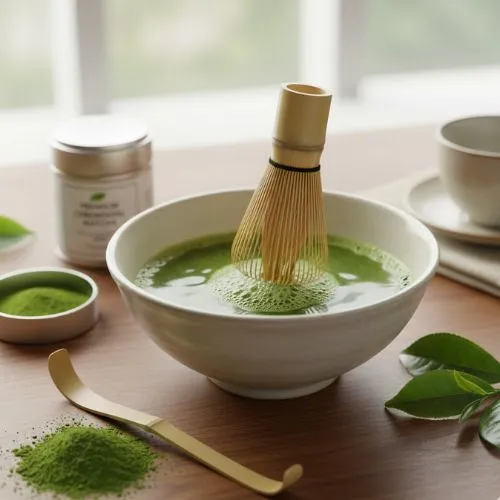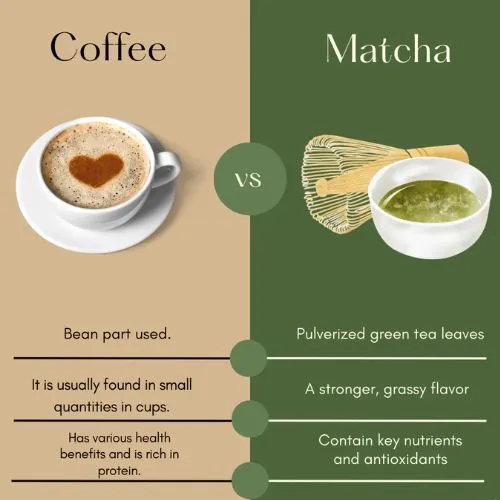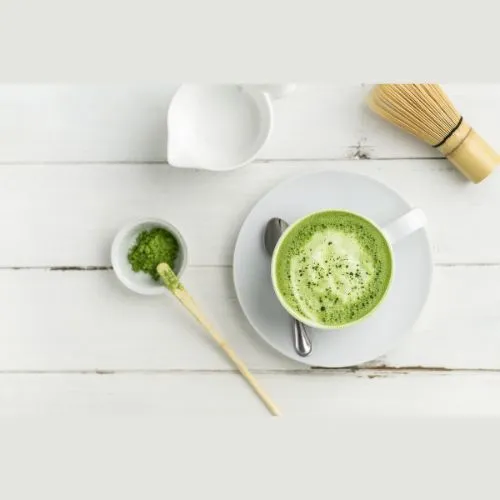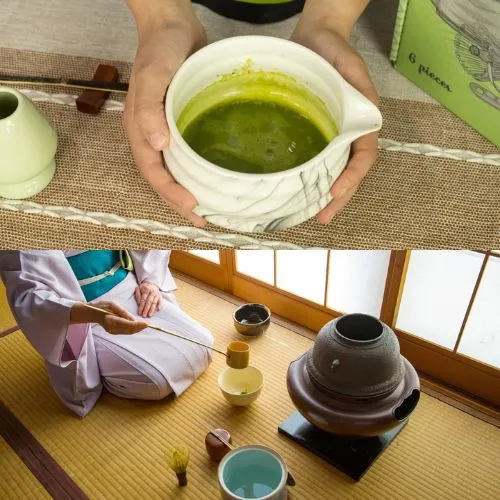Can matcha affect sleep?
Matcha, the vibrant green powder derived from specially grown and processed tea leaves, has gained immense popularity in recent years. Known for its unique flavor profile and potential health benefits, matcha has become a staple in many people's daily routines. However, as with any caffeinated beverage, questions arise about its impact on sleep. In this comprehensive guide, we'll explore the relationship between matcha powder and sleep, examining its caffeine content, effects on sleep patterns, and potential relaxation benefits.

Caffeine Content in Matcha Powder and Sleep Effects
Understanding Matcha's Caffeine Profile
Matcha powder, derived from shade-grown tea leaves, contains a significant amount of caffeine. The caffeine content in matcha can vary depending on factors such as the quality of the leaves, growing conditions, and processing methods. On average, a standard serving of matcha (about 1 teaspoon or 2 grams) contains approximately 60-70 mg of caffeine. This is comparable to a cup of brewed coffee, which typically contains 95-200 mg of caffeine.
Comparing Matcha to Other Caffeinated Beverages
While matcha's caffeine content is notable, it's essential to understand how it compares to other popular caffeinated drinks. A cup of black tea usually contains 14-70 mg of caffeine, while green tea provides 24-40 mg. Energy drinks can pack a punch with 70-200 mg per serving. Matcha falls somewhere in the middle of this spectrum, offering a moderate caffeine boost without the extreme highs associated with some energy drinks or strong coffee.
Caffeine's Impact on Sleep Architecture
Caffeine, regardless of its source, can significantly impact sleep architecture. It works by blocking adenosine receptors in the brain, which are responsible for promoting sleepiness. This blockage can lead to increased alertness and potentially disrupt natural sleep-wake cycles. Research has shown that consuming caffeine, especially in the late afternoon or evening, can delay sleep onset, reduce total sleep time, and alter sleep stages, particularly reducing the amount of deep, restorative sleep.

How Matcha Powder Influences Sleep Patterns?
The Unique Properties of Matcha
Matcha powder is not just about caffeine. It contains a unique combination of compounds that set it apart from other caffeinated beverages. One of the most notable is L-theanine, an amino acid that has been shown to promote relaxation without causing drowsiness. This compound works synergistically with caffeine, potentially mitigating some of its more jittery side effects and providing a more balanced, focused energy boost.
Matcha's Effect on Circadian Rhythms
Our circadian rhythms, or internal body clocks, play a crucial role in regulating sleep-wake cycles. Caffeine consumption, including that from matcha, can influence these rhythms. Studies have shown that caffeine can delay the body's production of melatonin, the hormone responsible for signaling to the body that it's time to sleep. This delay can shift the entire sleep cycle, potentially leading to difficulties falling asleep at the usual bedtime.
Individual Variations in Matcha Sensitivity
It's important to note that the effects of matcha on sleep can vary significantly from person to person. Factors such as age, body weight, caffeine tolerance, and genetic predisposition to caffeine sensitivity all play a role in how an individual responds to matcha consumption. Some people may find that they can enjoy matcha in the afternoon without any sleep disturbances, while others might experience insomnia from even small amounts consumed earlier in the day.

Matcha Powder and Relaxation: What Research Shows
The Role of L-Theanine in Promoting Relaxation
One of the most intriguing aspects of matcha powder is its high content of L-theanine. This amino acid has been the subject of numerous studies investigating its potential relaxation and stress-reducing properties. Research has shown that L-theanine can increase alpha brain wave activity, which is associated with a state of relaxed alertness. This unique property may help explain why some people report feeling calm yet focused after consuming matcha, unlike the jittery feeling often associated with coffee consumption.
Matcha's Potential Stress-Reducing Effects
Beyond its impact on brain waves, matcha has been studied for its potential stress-reducing effects. The combination of L-theanine and caffeine in matcha has been shown to reduce both psychological and physiological stress responses in some studies. This stress reduction could indirectly benefit sleep quality, as chronic stress is a well-known contributor to sleep disturbances and insomnia.
Balancing Stimulation and Relaxation
The unique balance of stimulating and relaxing compounds in matcha powder creates an interesting paradox when it comes to sleep. While the caffeine content could potentially disrupt sleep if consumed too close to bedtime, the relaxation-promoting properties of L-theanine might help some individuals wind down and prepare for sleep. This balance underscores the importance of timing when it comes to matcha consumption and its potential effects on sleep.
Matcha Powder Factory: Ensuring Quality and Consistency
When considering the effects of matcha on sleep, it's crucial to consider the source and quality of the matcha powder. A reputable matcha powder factory plays a vital role in ensuring consistency in caffeine and L-theanine content. High-quality matcha production involves careful cultivation, harvesting, and processing techniques that preserve the delicate balance of compounds that make matcha unique. By choosing matcha from a trusted source, consumers can have more confidence in the product's potential effects on their sleep and overall well-being.
Timing Matcha Consumption for Optimal Sleep
Given matcha's caffeine content and its potential effects on sleep, timing of consumption is key. Many experts recommend avoiding caffeine, including matcha, for at least 6 hours before bedtime. This guideline allows enough time for the body to metabolize most of the caffeine, reducing its potential to interfere with sleep onset. However, individual sensitivity to caffeine can vary widely, so it's important for each person to pay attention to their own body's responses and adjust accordingly.
Incorporating Matcha into a Healthy Sleep Routine
For those who enjoy matcha and want to maintain healthy sleep habits, there are several strategies to consider. Limiting matcha consumption to the morning or early afternoon can help minimize its impact on nighttime sleep. Some people find that replacing their afternoon coffee with matcha provides a gentler energy boost without the sleep disturbances they might experience with coffee. Additionally, establishing a consistent sleep schedule and practicing good sleep hygiene can help mitigate any potential negative effects of matcha on sleep.
The Importance of Moderation
As with many things in life, moderation is key when it comes to matcha and sleep. While moderate consumption of matcha can offer numerous health benefits, excessive intake, especially later in the day, may lead to sleep disturbances. It's important for individuals to find their own balance, considering factors such as their caffeine sensitivity, daily schedule, and sleep needs. By being mindful of their matcha consumption and its effects on their body, people can enjoy the benefits of this unique beverage without compromising their sleep quality.

Conclusion
Matcha powder's impact on sleep is complex and multifaceted. While its caffeine content can potentially disrupt sleep patterns, especially if consumed later in the day, its unique composition, including stress-reducing L-theanine, offers potential benefits for relaxation. The key lies in understanding individual sensitivity, practicing moderation, and timing consumption appropriately. By being mindful of these factors, matcha enthusiasts can enjoy this vibrant green powder without compromising their sleep quality. As research continues, we may uncover even more about the intricate relationship between matcha and sleep, helping us make more informed choices about our dietary habits and sleep routines.
At Yangge Biotech Co., Ltd., we understand the importance of quality when it comes to matcha powder and its potential effects on sleep and overall well-being. As a leading matcha powder factory, we are committed to providing high-quality, consistent products that meet the diverse needs of our customers. Whether you're looking to incorporate matcha into your daily routine or develop innovative matcha-based products, our team is here to support you with our expertise and premium matcha powder offerings. At Yangge Biotech Co., Ltd., we pride ourselves on being a premier matcha powder factory, delivering top-quality products to meet diverse market needs. Our matcha powder, available in various specifications including 800 Mesh, 2000 Mesh, and 3000 Mesh, is perfect for food and beverage applications. With our ISO, HACCP, Kosher, and Halal certifications, you can trust in the quality and safety of our products. Whether you're looking for bulk matcha powder or custom blends, our dedicated team is here to support your needs. Experience the Yangge difference - contact us at info@yanggebiotech.com to learn more about our innovative matcha solutions.
FAQ
Q: Can we get some samples to test before purchasing?
A: Of course, we can provide free samples of 20 to 100 grams, but the shipping cost is at the customer's expense. The shipping cost can be deducted from the next order, or the samples can be sent through your courier account.
Q: Do your products have relevant certifications?
A: Yes, our products are certified for HALAL, ISO, HACCP, Kosher, and other certifications.
Q: What is the minimum order quantity (MOQ)?
A: Small batches of samples can be customized according to your requirements.
Q: Do you offer OEM and ODM services? Can the formula be customized based on our own?
A: Of course, we provide ODM and OEM services to many customers. Our product range includes softgels, capsules, tablets, sachets, granules, and private label services. Simply contact us and let us know your requirements. Our experienced R&D team can also develop new products with specific formulas.
Please contact us to design your own branded products.
Q: How do you handle quality complaints?
A: First, we have a comprehensive quality control SOP. We provide authoritative third-party inspection reports for almost all products before shipment to minimize the possibility of quality issues. Second, we have a comprehensive return and exchange procedure. If there is a genuine quality dispute, we will strictly follow the SOP.
Q: How do you ship? How long does delivery take?
A: For small orders, we typically use DHL, UPS, EMS, FedEx, or TNT. Delivery typically takes 3-7 days. We also offer air and sea freight services. We have a strong freight forwarding team and can provide you with a one-stop service, including DDP and DDU.
Q: What are your payment terms?
A: 100% prepayment, payable by T/T, Western Union, MoneyGram, or PayPal.
Q: What is the shelf life of your products?
A: 2 years with proper storage.
Q: Is the packaging environmentally friendly?
A: We attach great importance to environmental protection and are constantly improving our product packaging. Some products are packaged in recyclable paper. Packaging materials are carefully selected to ensure product safety during transportation and storage, and to minimize environmental impact. We are committed to achieving a balance between environmental friendliness and practicality in our product packaging, and to contributing to sustainable development.
References
1. Keenan, E. K., Finnie, M. D., Jones, P. S., Rogers, P. J., & Priestley, C. M. (2011). How much theanine in a cup of tea? Effects of tea type and method of preparation. Food chemistry, 125(2), 588-594.
2. Nobre, A. C., Rao, A., & Owen, G. N. (2008). L-theanine, a natural constituent in tea, and its effect on mental state. Asia Pacific journal of clinical nutrition, 17(S1), 167-168.
3. Drake, C., Roehrs, T., Shambroom, J., & Roth, T. (2013). Caffeine effects on sleep taken 0, 3, or 6 hours before going to bed. Journal of clinical sleep medicine, 9(11), 1195-1200.
4. Unno, K., Noda, S., Kawasaki, Y., Yamada, H., Morita, A., Iguchi, K., & Nakamura, Y. (2017). Reduced stress and improved sleep quality caused by green tea are associated with a reduced caffeine content. Nutrients, 9(7), 777.
5. Camfield, D. A., Stough, C., Farrimond, J., & Scholey, A. B. (2014). Acute effects of tea constituents L-theanine, caffeine, and epigallocatechin gallate on cognitive function and mood: a systematic review and meta-analysis. Nutrition reviews, 72(8), 507-522.

Based on your location and order quantity, you will have the opportunity to receive a limited time free shipping promotion!

Who we are


